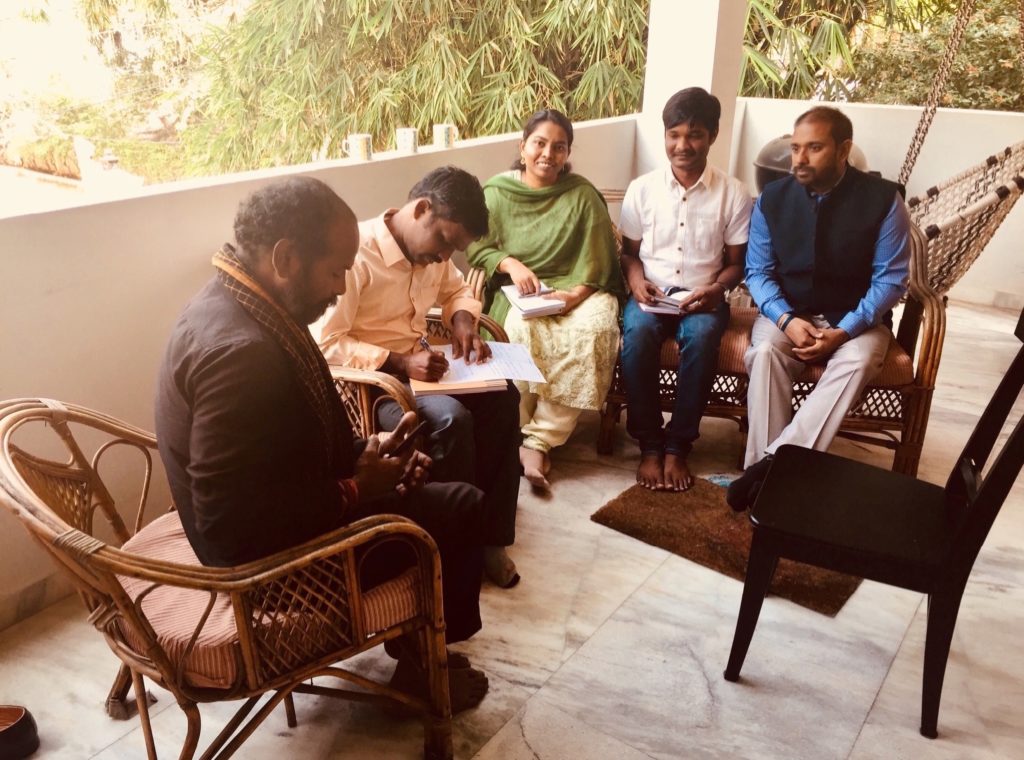Caring for more than 130 disabled or terminally ill children, Sarah’s Covenant Homes in Hyderabad, India has spent the past 10 years offering shelter to children no one else was willing to take. Two years ago, when Children’s Emergency Relief International (CERI) learned about their work, we were immediately inspired by their vision – to transition to a family-based care model and find families for each and every child in their care.
Today, we are proudly assisting Sarah’s Covenant Homes in the process of deinstitutionalization (releasing the residents from the institution to find care in the community) and family reunification, work that most would say is impossible in today’s India. What follows is the context to our partnership, and a story that best explains why this work is so important.
In 2016, CERI started training the Sarah’s Covenant Homes (SCH) team on alternative care for children and family strengthening (ways to safely keep children in their own families). While the topics seem simple and straightforward to someone living in the Western world, in India, children with disabilities are stigmatized, shunned and hidden from the rest of their society. Children with a disability or terminal illness are often placed in orphanages, forgotten about, and left without support or hope in life. Grim but true.
When SCH started their activity in India 10 years ago with the statement, “Children deserve families,” they were faced with a stark reality and a tough question: What to do if the families don’t want them? What to do if communities in India do not accept them?
The stigma and shame associated with children who have disabilities was the biggest stumbling stone SCH faced in implementing their vision. When CERI started a partnership with SCH, we helped them look at families in a different light. We re-conceptualized the reason behind the lack of acceptance of these children by their families and communities. Maybe it wasn’t that they did not want their children, but that they were simply overwhelmed and incapable or unable to care for them. Do we remove the child from the family, or remove the problems from the family? We chose the latter.
CERI trained SCH with a logical framework, designed to look at a family’s five fundamental needs – living conditions, family and social relationships, education, physical and mental health, and household economy – and support those areas through case management, preparing the family to care for their children with disabilities. SCH became one of the first organizations in India to reintegrate children with disabilities in their biological families.
| Reintegration Potential | |||||
| Total Children | Not eligible | Low | Med | High | |
| Home 1 | 15 | 4 | 8 | 1 | 2 |
| Home 2 | 24 | 3 | 15 | 1 | 5 |
| Home 3 | 24 | 3 | 12 | 2 | 7 |
| Home 4 | 17 | 0 | 15 | 0 | 2 |
| Total | 80 (100%) | 10 (12.5%) | 50 (62.5%) | 4 (5%) | 16 (20%) |
Our investment in the SCH team grew. In early 2018, we conducted an ample case review of the 80 children housed in SCH’s four small-group homes, evaluating their connectedness with their family, and helping them identify the cases that qualified for family reunification. Roughly 20% of SCH’s residents scored high in the possibility for immediate family reunification, while 5% scored medium in their family reintegration potential. However, 75% of SCH cases needed long-term family intervention before they could be reunited with their family.
Soumya’s Story
Here is a perfect illustration for how family reintegration worked for little Soumya, a six-year-old girl born blind with very little light perception.
Soumya’s mother died when she was only four, leaving her father depressed and in despair, feeling incapable of caring for Soumya and Anusha, her seven-year-old sister. Soumya’s father transported goods for a living and was often gone from home all day. He felt that the children would not be properly supervised if he were to keep them, so he sent Anusha to the village to live with her grandmother, and placed Soumya into an orphanage.

The conditions Soumya faced at the government-run orphanage were indescribable, but luckily SCH found Soumya and took her into their care. When Soumya arrived at SCH from the orphanage, she was very weak. Although she was four years old at the time, she was so malnourished that she was not yet able to walk. At SCH, Soumya began progressing in many ways. She quickly gained weight and strength, and began walking. She learned English and is now bilingual, speaking English and Telugu. Soumya is learning to read braille, sounding out small words, and mastering many pre-literacy skills for her age.
CERI worked with SCH’s social workers and Soumya’s father to draft a clear family reunification plan. The father was eager to learn more about the next steps in family reunification and accept the responsibility to do his part. As he is getting ready to remarry, CERI and SCH have been providing counselling for him and his new wife, helping them create the best home environment for Soumya and Anusha to live in. The father is also looking forward to building a sustainable local transportation business and enrolling both children in a school where Soumya’s needs will be fully met. The team at Sarah’s Covenant Homes commented:

We have been trying for 1 ½ years to reintegrate Soumya with her father. He loves her and after all our attempts we had lost hope. With the tools that CERI has offered, we know we can get Soumya back home in a safe, supportive and loving way
A Story of Redemption
Family reunification works for parents just as well as it works for children. The story of one couple who abandoned their two children (days old and two years old) at the hospital to run towards the train tracks and commit suicide moved us to tears. Luckily, the couple was unable to fulfill their plan, and today we are able to share their story.
On that fateful day, the couple (who suffer from HIV and Tuberculosis) felt hopeless. While they loved their two children, they felt unable to give them the life they deserved. It was a tragedy, as they didn’t see a reason to live without their children, but felt that their children’s lives would be much better if their parents were no more.

After a failed suicide attempt and several months in a hospital, the couple began to recover physically and mentally. The father gained employment and the mother gained hope. Thanks to SCH who cared for their children and had the capability to reintegrate the children with their family, this couple is now actively working toward family reunification. Both mother and father are ready to fulfill their new plan and bring their children home.
The mother commented, “We finally have hope. We are both orphans, but thanks to our case managers, we know we are not alone.”
CERI’s partnership with SCH has been rewarding beyond measure as it has allowed us to witness how two families and four children have been reunited in a wonderful way. This is just the beginning. Our goal is to continue expanding SCH’s capacity for case management and community-based services so that more children will be able to find their forever homes and be raised in families. CERI also aims to educate and train more residential institutions to do the same thing – grasp the importance of family, commit to deinstitutionalization, and build partnerships that will keep families and children together for generations to come.
Written by: Ian Anand Forber Pratt

